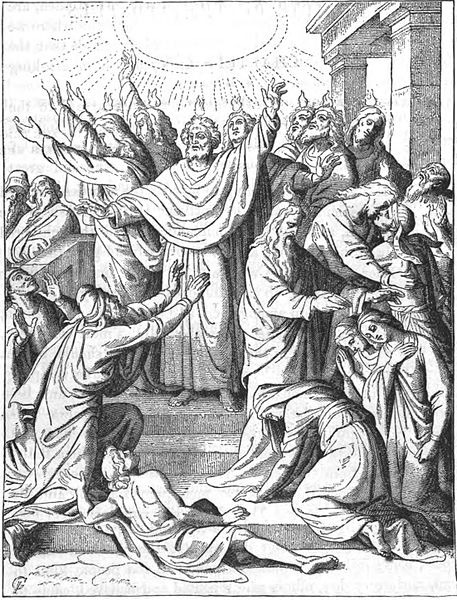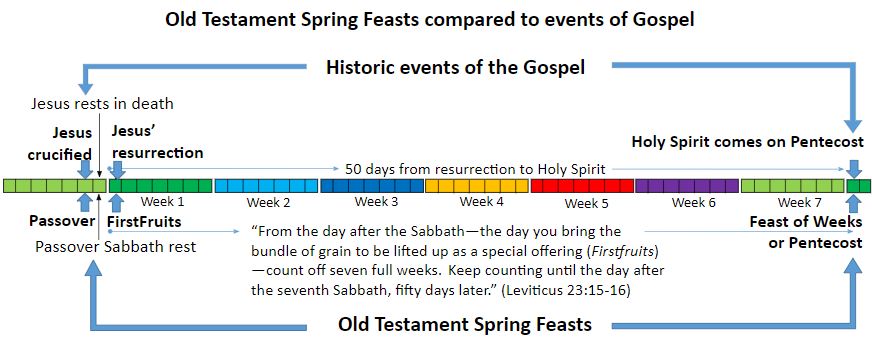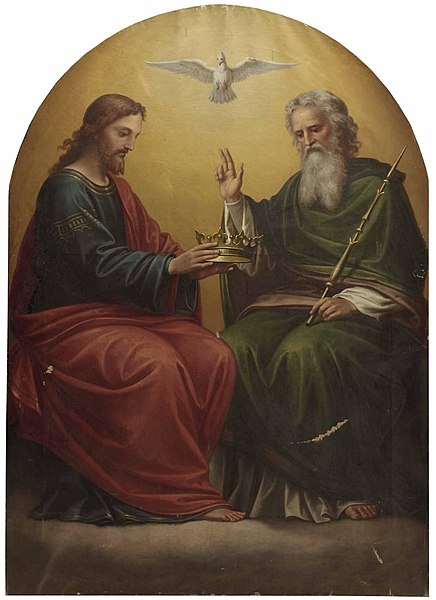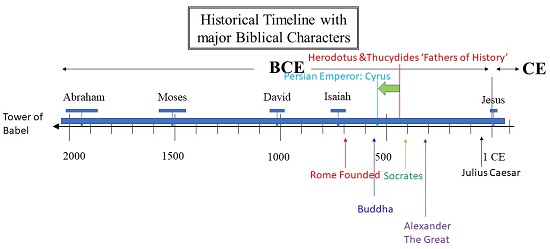The Day of Pentecost always comes on a Sunday. It celebrates a remarkable event. But it is not only what happened that day but when and why it happened that reveals the hand of God. It also offers a powerful gift for you.
What happened on Pentecost
If you heard of ‘Pentecost’, you probably learned that it was the day when the Holy Spirit came to indwell the followers of Jesus. This is the day that the Church, the “called-out ones” of God, was born. Acts chapter 2 of the Bible records the event. On that day, the Spirit of God descended on the first 120 followers of Jesus. Then they started proclaiming loudly in languages from around the world. It created such a commotion that thousands in Jerusalem at the time came out to see what was happening. In front of the gathered crowd, Peter spoke the first gospel message. The account records that ‘three thousand were added to their number that day’ (Acts 2:41). The number of gospel followers has been growing ever since that Pentecost Sunday.

The story of the Bible from Genesis to Revelation, PD-US-expired, via Wikimedia Commons
That day happened 50 days after Jesus’ resurrection. It was during these 50 days that Jesus’ disciples became convinced that Jesus had risen from the dead. On Pentecost Sunday they went public and changed history. Whether you believe in the resurrection or not, the events of that Pentecost Sunday have affected your life.
This understanding of Pentecost, though correct, is not complete. Many people want a repeat of that Pentecost Sunday through a similar experience. The first disciples of Jesus had this Pentecostal experience by ‘waiting for the gift of the Spirit’. So today people hope that likewise by ‘waiting’ He will come again in a similar way. Therefore, many people plead and wait for God to bring about another Pentecost. To think this way assumes that it was the waiting and praying that moved the Spirit of God back then. To think this way is to miss its precision. In fact, the Pentecost recorded in Acts Chapter 2 was not the first Pentecost.
Pentecost from the Law of Moses
‘Pentecost’ was actually an annual Old Testament festival. Moses (1500 BCE) had established several festivals to be celebrated through the year. Passover was the first festival of the Jewish year. Jesus had been crucified on a Passover day festival. The exact timing of his death to the sacrifices of the Passover lambs was meant as a sign.
The second festival was the feast of Firstfruits. The Law of Moses commanded its celebration on the ‘day after’ Passover Saturday (=Sunday). Jesus rose on Sunday, so his resurrection occurred exactly on the Firstfruits Festival. Since his resurrection happened on ‘Firstfruits’, it Promised that our resurrection would follow later (for all those who trust him). His resurrection is literally a ‘firstfruits’, just as the festival name prophesied.
Precisely 50 days after the ‘Firstfruits’ Sunday the Jews celebrated Pentecost. (‘Pente’ for 50. It was also called Feast of Weeks since it was counted by seven weeks). Jews had been celebrating Pentecost for 1500 years by the time the Pentecost of Acts 2 happened. The reason that there were people from all over the world that Pentecost day in Jerusalem to hear Peter’s message was precisely because they were there to celebrate the Old Testament Pentecost. Today, Jews still celebrate Pentecost but call it Shavuot.
We read in the Old Testament how Pentecost was to be celebrated:
Count off fifty days up to the day after the seventh Sabbath, and then present an offering of new grain to the LORD. From wherever you live, bring two loaves made of two-tenths of an ephah of the finest flour, baked with yeast, as a wave offering of firstfruits to the LORD.
Leviticus 23:16-17
Precision of Pentecost: Evidence of a Mind
The Acts 2 Pentecost events precisely coordinate with the Old Testament Pentecost (The Feast of Weeks). We know this since they occurred on the same day of the year. The crucifixion of Jesus occurring on the Passover, the resurrection of Jesus occurring on FirstFruits, and the Acts 2 Pentecost occurring on the Feast of Weeks, points to a Mind coordinating these through history. With so many days in a year why should the crucifixion of Jesus, his resurrection, and then the coming of the Holy Spirit happen precisely on each day of the three spring Old Testament festivals? Unless they were planned. Precision like this happens only if a mind is behind it.

Did Luke ‘make up’ Pentecost?
One might argue that Luke (the author of Acts) made up the Acts 2 events to ‘happen’ on the Feast of Pentecost. Then he would have been the ‘mind’ behind the timing. But his account does not say that Acts 2 is ‘fulfilling’ the Feast of Pentecost. It does not even mention it. Why go to such trouble of creating these dramatic events to ‘happen’ on that day but not help the reader see how it ‘fulfills’ the Feast of Pentecost?
In fact, Luke did such a good job of reporting events, rather than interpreting them, that most people today do not know that the events of Acts 2 fell on the same day as the Old Testament Feast of Pentecost. Many people think that Pentecost simply began at Acts 2. Since most people today are not aware of the connection between them, Luke would be in the impossible situation of being a genius to invent the connection but utterly inept in selling it.
Pentecost: A New Power

Max Fürst (1846–1917), PD-US-expired, via Wikimedia Commons
Instead, Luke points us to a prophecy from the Old Testament book of Joel. This predicted that one day the Spirit of God would pour out on all peoples. The Pentecost of Acts 2 fulfilled that.
One reason that the Gospel is ‘good news’ is that it provides power to live life differently – better. Life is now a union between God and people. And this union takes place through the indwelling of the Spirit of God – which began on the Pentecost Sunday of Acts 2. The Good News is that we can now live life on a different level. We live it in a relationship with God through His Spirit. The Bible puts it like this:
And now you Gentiles have also heard the truth, the Good News that God saves you. And when you believed in Christ, he identified you as his own by giving you the Holy Spirit, whom he promised long ago. The Spirit is God’s guarantee that he will give us the inheritance he promised and that he has purchased us to be his own people. He did this so we would praise and glorify him.
Ephesian 1:13-14
The Spirit of God, who raised Jesus from the dead, lives in you. And just as God raised Christ Jesus from the dead, he will give life to your mortal bodies by this same Spirit living within you.
Romans 8:11
Not only so, but we ourselves, who have the firstfruits of the Spirit, groan inwardly as we wait eagerly for our adoption to sonship, the redemption of our bodies.
Romans 8:23
The indwelling Spirit of God is another firstfruits, because the Spirit is a foretaste – a guarantee – of completing our transformation into ‘children of God’.
The gospel offers an abundant life not through possessions, pleasure, status, wealth and all the other passing trifles pursued by this world. Solomon found these to be such an empty bubbles. But rather the abundant life comes by the indwelling of the Spirit of God. If this is true – that God offers to indwell and empower us – that would be good news. The Old Testament Pentecost with the celebration of fine bread baked with yeast pictured this coming abundant life. The precision between the Old and New Pentecosts is perfect evidence that it is God who is the Mind behind this precision. Thus He stands behind this power of an abundant life.









